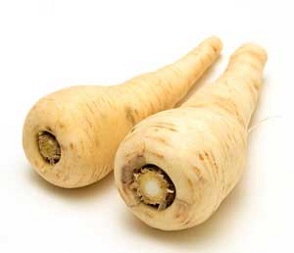
The parsnip (Pastinaca sativa) is a root vegetable closely related to the carrot and parsley. It is a biennial plant usually grown as an annual. Its long, tuberous root has cream-colored skin and flesh; and left in the ground to mature, it becomes sweeter in flavor after winter frosts. In its first growing season, the plant has a rosette of pinnate, mid-green leaves. If unharvested, it produces its flowering stem, topped by an umbel of small yellow flowers, in its second growing season. By this time, the stem is woody and the tuber is inedible. The seeds are pale brown, flat, and winged.
Scientific (Botanical) Name is Pastinaca sativa
Parsnips Nutrition Facts
These versatile vegetables contain high levels of potassium, manganese, magnesium, phosphorous, zinc, and iron, in addition to an impressive range of vitamins, including vitamin B, vitamin C, vitamin E, and vitamin K, as well as high levels of fiber and some protein.
Health Benefits Of Parsnips
1. Weight Loss
2. Osteoporosis
3. Increases Energy Production
4. Cure of Lead Toxicity
5. Mental and Emotional Disorders
6. Immune System
7. Heart Health
8. Birth Defects and Metabolism
9. Growth and Development
10. Dietary Fiber
11. Fights Cancer